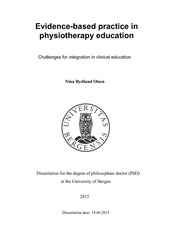| dc.contributor.author | Olsen, Nina Rydland | en_US |
| dc.date.accessioned | 2015-07-13T07:42:22Z | |
| dc.date.available | 2015-07-13T07:42:22Z | |
| dc.date.issued | 2015-06-19 | |
| dc.identifier.isbn | 978-82-308-2599-0 | en_US |
| dc.identifier.uri | https://hdl.handle.net/1956/10147 | |
| dc.description.abstract | Background and aim: Physiotherapists are expected to practice evidence-based. Evidence-based practice (EBP) should be integrated into undergraduate education to ensure that future graduates have the necessary EBP knowledge, skills and attitudes. Results from previous research show that students struggle to apply EBP in real patient situations. Efforts are needed to ensure that EBP is integrated into clinical physiotherapy education. The overall aim of this study was to contribute to knowledge and understanding of how to ensure use of EBP in clinical physiotherapy education. Methods: Three studies with different design were conducted. Paper I: In this crosssectional study, five cohorts (2006-2010) with final year physiotherapy students participated. In total, 246 students were eligible for this study. We used a 42-item questionnaire with items related to EBP behaviour, ability and barriers, and investigated associations using Spearman’s rho (r). Paper II: In this interpretive descriptive study six focus group interviews were conducted to explore beliefs, experiences and attitudes related to third year students’ use of EBP in clinical physiotherapy education among students (n=16), clinical instructors (CIs) (n = 9) and visiting teachers (n = 4). Paper III: In this non-randomized controlled study the short and long term impact of a six-month multifaceted and clinically integrated training program in EBP was evaluated among CIs in physiotherapy on EBP knowledge, skills, beliefs and behaviour. We invited 37 CIs to participate. Three self-administered questionnaires were administered pre- and post-intervention, and at six-month followup (The Adapted Fresno Test (AFT), the EBP Belief Scale and the EBP Implementation Scale). Results: Paper I: We achieved a response rate of 73 %. The association between the level of EBP exposure and students’ self-reported EBP behaviour, abilities and barriers was low for most items in the questionnaire. The strongest correlation was found between the level of EBP exposure and ability to critically appraise research evidence (r = 0.41, p < 0.001), and to what extent the participants perceived critical appraisal skills as a barrier (r = -0.31, p < 0.001). A statistically significant association related to students’ use of research evidence in real clinical situations was not found. Paper II: Four integrative themes emerged from the constant comparative analysis: 1) attempt to apply EBP, 2) novices in clinical practice, 3) prioritize practice experience over EBP and 4) lack role models in EBP. Students tried to search for research evidence and to apply this knowledge during clinical placements. As novices they needed more background knowledge than research evidence, tended to lean on their CIs, and were more eager to gain practical experience than practicing evidence-based physiotherapy. Students and CIs perceived a lack of role models in EBP. Paper III: In total, 29 CIs agreed to participate in the study (Intervention group: n = 14, control group: n = 15). One in the intervention group and five in the control group were lost to follow-up. At follow-up, the group difference was statistically significant for two of the outcome measures: the AFT (mean difference = 37, 95% CI (15.9 - 58.1), p < 0.001) and the EBP Beliefs scale (mean difference = 8.1, 95% CI (3.1 - 13.2), p = 0.002), but not for the EBP Implementation scale (mean difference = 1.8. 95% CI (-4.5 - 8.1), p = 0.574). Comparing measurements over time, we found a statistically significant increase in mean scores related to all outcome measures for the intervention group only. Conclusions: With increasing exposure to EBP students more frequently critically appraised research evidence (Paper I). A similar association was not found with regard to use of research evidence in real clinical situations (Paper I). Interviews with students, CIs and visiting teachers revealed that students at clinical placement attempted EBP, but as novices they struggled, leaned on their CIs, prioritized practice experience over EBP and lacked role models in EBP (Paper II). As CIs are in a unique position to influence students during clinical education we conducted a multifaceted and clinically integrated training program in EBP among CIs (Paper III). This training program was successful in improving EBP knowledge, skills and beliefs among CIs. Future studies are needed to ensure long-term EBP behaviour change among CIs. Unanswered questions are related to the impact of a training program in EBP on CIs’ abilities to apply EBP knowledge and skills when supervising students, and whether improved EBP competence among CIs will have an impact on students’ EBP behaviour. Further research is also needed to explore strategies for EBP exposure throughout the curriculum, regarding content, timing, amount and type of training. | en_US |
| dc.language.iso | eng | eng |
| dc.publisher | The University of Bergen | eng |
| dc.relation.haspart | Paper I: Olsen, N. R., Lygren, H., Espehaug, B., Nortvedt, M. W., Bradley, P., & Bjordal, J. M. (2014). Evidence-based Practice Exposure and Physiotherapy Students' Behaviour during Clinical Placements: A Survey. Physiotherapy Research International, 19(4), 238-247. The article is not available in BORA due to publisher restrictions. The published version is available at: <a href="http://dx.doi.org/10.1002/pri.1590" target="blank">http://dx.doi.org/10.1002/pri.1590</a> | en_US |
| dc.relation.haspart | Paper II: Olsen, N. R., Bradley, P., Lomborg, K., & Nortvedt, M. W. (2013). Evidence based practice in clinical physiotherapy education: a qualitative interpretive description. BMC Medical Education, 13(1), 52. The article is available at: <a href="http://hdl.handle.net/1956/10134" target="blank"> http://hdl.handle.net/1956/10134</a> | en_US |
| dc.relation.haspart | Paper III: Olsen, N. R., Bradley, P., Espehaug, B., Lygren, H., Frisk, B., Nortvedt, M. W., & Bjordal, J. M. (2014). Impact of a Multifaceted and Clinically Integrated Training Program in Evidence-Based Practice on Knowledge, Skills, Beliefs and Behaviour among Clinical Instructors in Physiotherapy: A Non- Randomized Controlled Study. PLoS One. 2015;10:e0124332. The article is available at: <a href="http://hdl.handle.net/1956/10146" target="blank">http://hdl.handle.net/1956/10146</a> | en_US |
| dc.subject | Kunnskapsbasert praksis | eng |
| dc.title | Evidence-based practice in physiotherapy education. Challenges for integration in clinical education | en_US |
| dc.type | Doctoral thesis | |
| dc.rights.holder | Copyright the author. All rights reserved | |
| dc.identifier.cristin | 1246955 | |
| dc.subject.nsi | VDP::Medisinske Fag: 700::Helsefag: 800::Fysioterapi: 807 | en_US |

